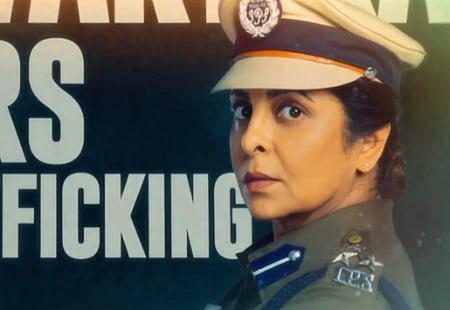Delhi Crime Season 3 review: Shefali Shah–Rasika Dugal duo shine in hard-hitting take on human trafficking
Everyone is trapped in shades of grey — victims, cops, traffickers, survivors, informants

Dubai: Whenever I watch shows like Mare of Easttown, where Kate Winslet plays a police detective carved with equal parts brilliance, bruises and moral ambiguity, I find myself asking: Do women in Hindi series ever get roles this solid? Roles that expect them to be flawed, vulnerable and stoic without apology?
With Delhi Crime Season 3, the answer — gratifyingly — is yes.
This season pulls you, almost without resistance, into the world of the Baby Falak case, the horrific crime that rattled India’s capital. Baby Falak — a two-year-old admitted to AIIMS in 2012 with a fractured skull and bite marks — became a symbol of India’s failures in child protection and the grim underbelly of human trafficking.
Delhi Crime uses this tragedy not for sensationalism but as a lens to examine the systems that fail the most vulnerable.
Instead of turning the case into lurid television, the series uses it as an entry point into a larger, more uncomfortable truth: a trafficking network where victims and perpetrators exist on the same brutal continuum.
Early on, there’s a scene that sets the emotional tone.
DCP Vartika Chaturvedi (Shefali Shah), surveying a crime that has the force rattled, quietly says: “Let us not criminalise the culprit.”
It stops you cold — because the “culprit” is herself a young trafficked girl. In a genre that so often loves its monsters, Delhi Crime insists on empathy instead of easy condemnation.
Shefali Shah is, once again, a force of nature
As Vartika, Shefali Shah continues to be the show’s moral and emotional spine. Stoic yet fraying, calm yet exhausted, dignified yet deeply vulnerable — she brings a lived-in heaviness that anchors the entire season. Shah’s performance reminds you why Delhi Crime remains the gold standard for humane law-enforcement storytelling in India.
Rasika Dugal Gets One of the Season’s Most Poignant Moments
Amid the chaos, Rasika Dugal quietly delivers one of the most searing scenes of the season. Her character, Neeti, is now divorced, overworked, and learning to live with a career that consumes more than it gives back.
There is a moment — small, almost throwaway — where she opens up to a younger cop about how marriage isn’t easy when you’re a police officer, how the job erodes not just the body but the bonds you try so hard to protect. It’s written with tenderness and performed with restraint, and it cuts straight through you.
Huma Qureshi Is deliciously awful — and impossible to look away from
And then comes Huma Qureshi, a revelation. Grounded in her Haryanvi roots, she plays a character who is, frankly, a terrible human being. But Qureshi never turns it into melodrama. She lets the ugliness simmer, making her the kind of antagonist who feels unnervingly real. You love to hate her — and the season is richer for it.
One of Delhi Crime’s biggest triumphs is how it portrays police officers as human beings hollowed out by the job. The cast looks tired, beaten down, worn out by work and time — not stylised or polished, but truly fatigued. Their brutality, when it surfaces, isn’t celebrated; it’s the residue of a system stretched to its breaking point.
Yet flickers of compassion and humanity remain — and the show never lets you forget that.
A season without easy heroes or convenient villains
Season 3 refuses moral binaries. No hyper-stylised villains. No macho saviours. Everyone is trapped in shades of grey — victims, cops, traffickers, survivors, informants. The show thrives in that messiness. Be warned, towards the middle, it meanders a bit but then manages to fall on track by the last two episodes.
A procedural that respects its audience
But what makes these bumps forgettable is that this is one of the few series where there’s no emotional spoon-feeding here. No sentimental montage. No melodramatic music cues. The storytelling trusts that the viewer is mature enough to sit with discomfort, silence and ethical ambiguity.
The Verdict
Delhi Crime Season 3 is not an easy watch — and that’s precisely its power. It is dense, humane, emotionally layered and often suffocating in its honesty. It refuses sensationalism and instead zeroes in on the people navigating these dark spaces.
If Season 1 gave India its first internationally respected crime drama, Season 3 proves that this series remains unmatched.
It’s haunting. It’s raw. It’s deeply, achingly humane.
And it reminds you that the truth is rarely a clean moral line — it’s usually exhausted, conflicted, and sitting under a flickering tube light in a Delhi police station, just trying to make it through the night.
Network Links
GN StoreDownload our app
© Al Nisr Publishing LLC 2026. All rights reserved.